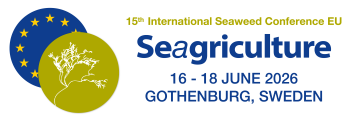First abstract is in! Tom Wijers on the Zeevivo project
Site visit to ALGAplus
Throwback to Seagriculture 2015
1st Seagriculture press release
Introducing one of Seagriculture's session topics: The Portuguese seaweed share
Summary on the Conference day 1
Latest Press Release March 2015
CARGILL supporter of SEAGRICULTURE 2016
[...]
